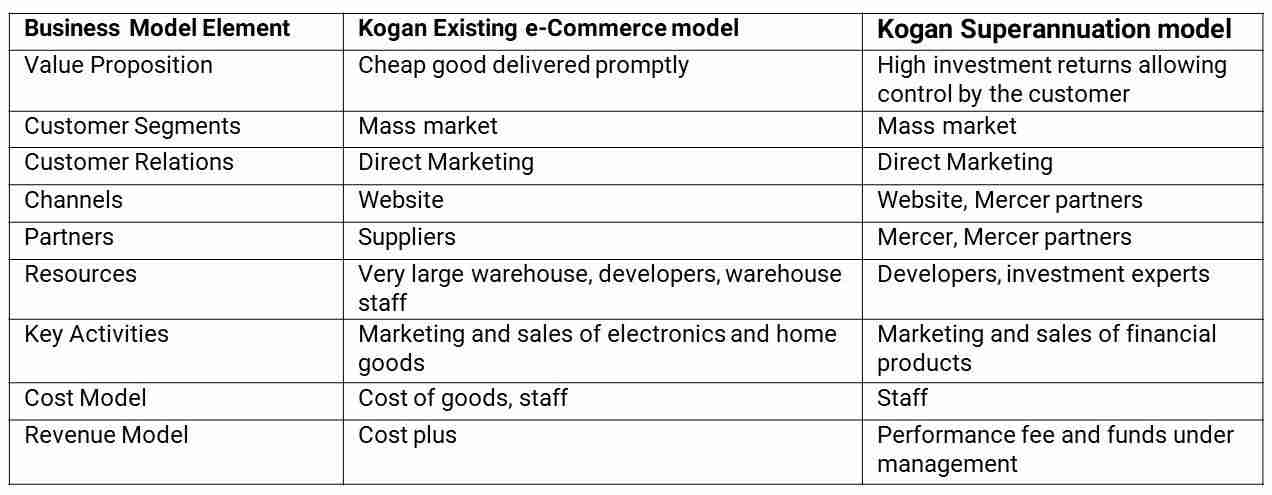Last week, online retailer Kogan.com announced that it will enter the $2.7 trillion superannuation market with an “ultra-low-fee” offering in partnership with Mercer.
Kogan is known in Australia as a supplier of electronics and homewares via an e-commerce portal.
This is a significant departure by Kogan from its traditional business, although not the first, as Kogan now also represents a significant slice of the mobile phone service provider market, having introduced a very low-cost offering of mobile phone plans.
Under its agreement with Mercer, Kogan.com will provide the branding and marketing while Mercer will operate the fund and provide customer service.
Kogan.com claims 1.45 million active customers and is aiming to launch the superannuation product early in 2019.
Australians held 28.6 million superannuation accounts with $2.7 trillion in assets at June 30, according to Association of Superannuation Funds of Australia.
Also last week, Google announced that it is looking to move to a subscription model. It has been reported that this will initially be for Android apps and games.
If Google does in fact launch such a service, dubbed “Play Pass” by some, who knows where such a subscription service might lead Google in the future?
Both Google and Kogan are exceptionally smart. They are looking to disrupt their traditional business model before they become commoditised. Many companies look to implement new business models way too late, since once a business is on the decline, it is very hard to backtrack.

Kogan’s move is exceptionally interesting.
If we are to compare the current e-commerce business model with that of a superannuation find, there are a myriad of differences, summarised in the table below.
We will use elements of Osterwalder’s Business Model Canvas for comparison.
The key difference involves moving from an asset-heavy model of warehousing goods and shipping physical products to an asset-light model which needs no warehousing facilities or the handling of physical product.
As well, the cost and revenue models will change significantly, as will the Resources and Partners.

Kogan is smart. Very smart. As Amazon scales up its Australian business, Kogan is definitely protected more than many retailers by its online presence, but well knows what a formidable opponent Amazon will become over time.
Diversification is essential. Just like Amazon and Alibaba, Kogan has decided to leverage its customer base and marketing machine to move into financial services.
Mind you, Amazon has been experimenting with this for a long time.
The e-commerce giant is already making small-business loans, finding ways to cut into banks’ swipe-fee revenue, and competing against prepaid card issuers.
Several recent developments suggest that Amazon has substantially broader ambitions. Cheque accounts, small business credit cards and even mortgages all appear to be in the company’s sights.
Apple has also made the move to financial services with Apple Pay. And of course, they have been in the game in storing your credit card and executing transactions for a long time with iTunes and Apple Music.
Kogan’s thinking probably goes like this: In the face of possible commoditisation of the e-commerce business with possibly shrinking margins, take a leaf out of Apple and Amazon’s strategy and move into financial services. Clever. And timely – while the existing business is doing well.
The key here is to adopt a new business model before the decline of the old. Easy to say, not always easy to implement.
Many organisations have started alternative business models within their own organisation, only to find that the antibodies of the incumbent model overwhelm the DNA of the new model.
Time will tell if Kogan, and Google, are successful with their new models.
“Entrepreneurship drives innovation, it drives thought leadership, it drives employment, it improves the wealth of nations, it creates jobs.”
Ruslan Kogan, CEO, Kogan.com
Contact Us
Have any questions? Want to know how we can help you and your organisation? Contact us using this form.
We can work with you to design and support implementation of a strategy for your business unit, for your entire organisation, or for any segment of your organisation where a fresh approach will add value.
We will use a combination of globally-recognised leading-edge processes, coupled with our proprietary validated toolbox to develop a bespoke, customised strategy, which we can assist you in implementing, that will deliver tangible impact and value to your organisation and your customers.
We have been designing and implementing strategy solutions since 2003 and we have the expertise and the experience not only to deliver, but to overdeliver.
Join 10,000 others who want the latest insights, tools, tips and resources. We help you get better results by staying on top of the latest methodologies and thinking.












